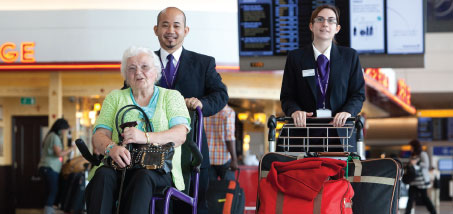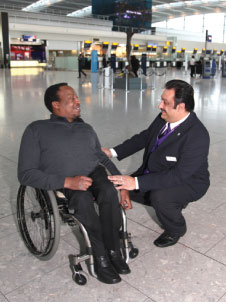
Patterson: “The training includes the use of handheld devices, which track and log when a client has been transported safely to or from the aircraft.”
The conclusion of the report suggested that the implementation of the Regulation has been positive overall, but there is still work to be done. The existence of a single legal framework has been the catalyst of significant improvement in the general level of service offered to PRMs and the report explained that this framework “appears sufficiently flexible to accommodate any necessary improvement without the need for a legislative process at this point”.
On the back of the report, the Commission has proposed a number of axes of improvement within the existing framework. These concern the uniform interpretation of the Regulation; improving how the regulatory instruments work in practice; strengthening the efficacy of the penalties and their supervision by national authorities; and handling the issue of medical oxygen to encourage negotiations about a voluntary commitment among all parties concerning the use of medical oxygen on board.
Exceeding expectations
In order to ensure that they can provide a high-level of service to PRMs, airports tender out contracts to third party providers (as permitted under Article 8 of the Regulation) who take responsibility for ensuring that the service offered meets and surpasses the general requirements laid out in the Regulation. In this regard, many European airports are working with various vendors in this area. One such example can be found at London Heathrow, where OmniServ, a subsidiary of US-based AirServ Corporation, was last year awarded the five-year contract to provide PRM services for every commercial flight arriving and departing from the airport.
The employees of the companies who had previously provided the airport’s PRM services were transferred under TUPE (Transfer of Undertakings (Protection of Employment)) legislation into OmniServ and a detailed training process was embarked upon to ensure that all staff were fully prepared to offer the specialised level of service. “The aim of the company is based on excellent customer service to make the passengers’ transition through the airport as smooth and stress-free as possible,” said Ernie Patterson, chairman, OmniServ.
In accordance with Article 9 of the Regulation, the level of importance placed on providing a high-quality service to PRMs is further underlined by the service level agreements between the airport and the service company. Continuing with the case of London Heathrow and OmniServ, the agreement states: “For pre-booked departing passengers, upon arrival at the airport, once they have made themselves known: 95% of passengers should wait no longer than 10 minutes; 99.999% should wait no longer than 17 minutes.” For those who haven’t pre-booked, these figures stand at 15 and 20 minutes respectively.

Nigel Brown, Disability Traveller Advocate for OmniServ, in discussion with an OmniServ employee.
To ensure that these targets are met, OmniServ, in collaboration with the Disney Institute, has developed its own tailored training packages. All employees have successfully completed the new training modules and as a consequence, AirCare, the new brand of OmniServ for the PRM contract at Heathrow, was launched in April. Each customer is also encouraged to fill out a customer care card to provide feedback on the service they have received, while members of staff who perform outstanding customer service are recognised through the Chairman’s ‘110% Club’ award.
Patterson added: “The training also includes the use of handheld devices, which track and log when a client has been transported safely to or from the aircraft. This helps to save time as an employee can be assigned a customer based on where they are within the terminal.”
This combination of a technological and training-based approach to increasing productivity is helping to ensure that PRMs transiting through London Heathrow receive a high-level and personal service, as per the terms of the EU Regulation.Overall, the European Commission’s view is that the implementation of this Regulation is overall satisfactory – a legislative revision is not necessary at this stage. However, ACI EUROPE has repeatedly informed the European Commission and National Enforcement Bodies about the need to clarify some aspects of Regulation 1107/2006, mainly related to the definition of PRM, the importance of pre-notification, the PRM charge and the handling of the mobility equipment. It has welcomed the European Commission’s announced plan to propose Guidelines promoting a uniform interpretation of the Regulation, in January 2012.







